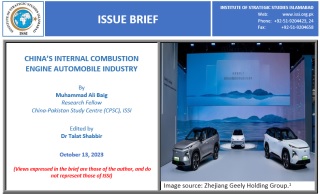Introduction
In 2009, China became world’s largest automobile manufacturing industry and since that time onwards, its research and development in automotive manufacturing is flourishing.[2] According to the latest available data, in 2021, China produced a total of 21.41 million passenger cars and 4.67 million commercial vehicles (Figure 1).[3] Out of those 21.41 million passenger cars, 3.34 million were electric vehicles and the rest i.e., 18.07 million had an Internal Combustion Engine (ICE).[4] To fulfil its climate-related commitments, China is aiming to reach carbon emissions peak by 2030 and carbon neutrality by 2060; hence, it aims to reduce the production of ICE vehicles. President Xi Jinping said that “the path, method, pace and intensity to achieve this goal should and must be determined by ourselves, and will never be influenced by others.”[5] Till 2021, coal was mainly used for generating more than 60 percent of energy;[6] however, the reduction in ICE vehicles production and the booming electric vehicle industry reveals China’s commitment to comply with the Paris Agreement and to mitigate the negative effects of climate change (Figure 2).[7]















